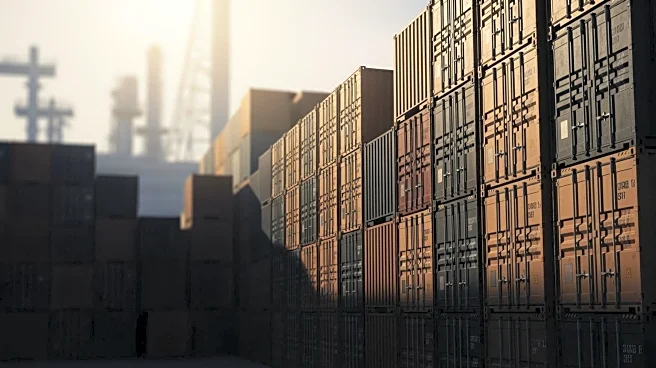What's Happening?
The Trump administration has implemented a new tariff classification that has resulted in a $34 million annual fee for Atlantic Container Line (ACL), a major US-based shipping company. The change, effective from October 14, reclassifies ACL's ships from 'container
ships' to 'roll-on/roll-off' (Ro/Ro) vessels, based on their construction rather than their cargo. This reclassification under Section 301, a law addressing unfair foreign trade practices, means each vessel incurs a port fee five times annually, once for each US port call. ACL's CEO, Andrew Abbott, expressed shock at the fees, noting that the company's ships are unique hybrids carrying mostly containers, with only a small percentage of Ro/Ro freight. Abbott argues that the classification should reflect the majority cargo, which is containers, rather than the ship's construction.
Why It's Important?
The tariff reclassification has significant implications for ACL and potentially other shipping companies operating in the US. The $34 million fee could force ACL to reconsider its US-linked operations, impacting transatlantic trade routes. This decision highlights the broader impact of trade policies on domestic businesses, particularly those with unique operational models. The reclassification may discourage companies from maintaining headquarters in the US, contrary to the administration's goal of promoting domestic business. Additionally, the policy could affect the competitive landscape, as foreign carriers might not face similar fees, potentially disadvantaging US-based firms.
What's Next?
ACL may need to explore legal or diplomatic avenues to challenge the tariff classification, seeking relief or adjustment from the US Trade Representative. The company might also consider restructuring its operations to mitigate the financial impact. Other stakeholders, including industry groups and trade associations, could lobby for policy revisions to prevent similar situations. The broader shipping industry will likely monitor this case closely, as it could set a precedent for future tariff classifications. Political leaders and policymakers may face pressure to address the unintended consequences of trade policies on domestic businesses.
Beyond the Headlines
The tariff reclassification raises questions about the criteria used for vessel classification and the balance between construction characteristics and actual cargo. It underscores the complexity of trade regulations and their potential to disrupt established business models. The situation also highlights the need for clear communication and understanding between government agencies and industry stakeholders to avoid unintended economic consequences. Long-term, this case could influence how trade policies are crafted and implemented, emphasizing the importance of considering industry-specific nuances.














